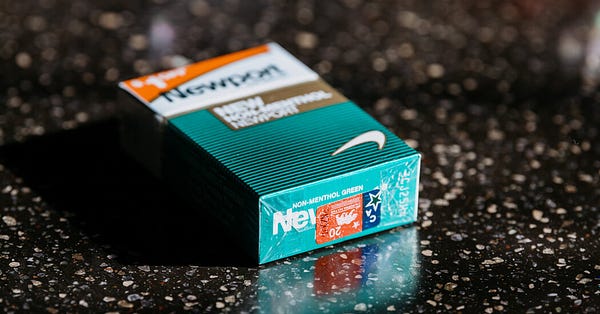The FDA has been planning to impose a menthol cigarette ban for years. Menthol is a compound extracted from mint which, when added to cigarettes, eases the harsh effect that smoking has on the throat and lungs.
There is evidence that menthol can enhance the addictive effects of nicotine and that it makes cigarettes more attractive to youth populations.
Menthol cigarettes have been around since the 1920s and account for about 30% of cigarette volumes. Women tend to prefer menthols. Over 80% of African-American smokers smoke menthols.
Menthol is banned in the European Union as well as in several countries such as Brazil, Canada, Turkey, and the United Kingdom. In April of 2022, the FDA announced its plan to ban the sale of menthol cigarettes in the U.S. It hopes that doing so will lower smoking rates. California and Massachusetts already have menthol bans in place.
But does banning menthol in cigarettes actually reduce smoking rates?
The evidence is mixed. In jurisdictions without menthol bans, studies show that menthol and non-menthol smokers quit at similar rates. Evidence also shows that banning menthols reduces the number of people who get hooked on nicotine to begin with. Menthol bans do correlate with higher rates of quitting among menthol smokers compared with non-menthol smokers. Once a menthol smoker quits, he is less likely to relapse if menthols are no longer on the market.
Evidence also shows that most menthol smokers will just switch to non-menthol cigarettes when menthols are removed from the market. Of course, some will quit altogether. Some will supplement plain cigarettes with menthol filters, capsules, or cards. And some will switch to e-cigarettes.
In 2020, the U.S. Surgeon General’s office reported that while there is evidence suggesting that restricting menthol and other flavored cigarettes does increase cessation rates, that evidence is not sufficient to conclude a causal relationship. It also noted that cessation rates in certain population groups are especially unaffected by such bans.
Tobacco companies have not stood still as governments around the world have moved to ban menthols. Leading up to the effective dates of menthol bans in Canada and the E.U., Big Tobacco promoted a number of new products aimed at accommodating menthol smokers who would soon be stuck with regular cigarettes. For example, tobacco companies marketed menthol capsules, which can be attached to regular cigarettes and crushed to release menthol. They marketed menthol filters, which can be placed on the tips of regular cigarettes to provide a soothing menthol effect. And they marketed menthol cards, which can be inserted into packs of cigarettes, infusing the sticks with the smell and flavor of menthol. These products largely exist outside the scope of menthol cigarette bans.
In California, where menthols are illegal, Big Tobacco has launched a new “crisp” non-menthol cigarette formula that presumably dampens the harsh feeling smoking has on the mouth and throat.



A year after the E.U. enacted its menthol ban, researchers found that about 90% of pre-ban menthol smokers kept smoking. Over 20% reduced the number of cigarettes they smoked per week. Over 75% of pre-ban menthol smokers switched to regular cigarettes. Others opted to roll their own tobacco using menthol filters, some switched to menthol cigars, and some switched to e-cigarettes. Over a third of pre-ban menthol smokers reported that they had found ways to get a hold of menthol cigarettes in spite of the ban, lending support to Big Tobacco’s argument that bans lead to unsafe and unregulated black-market activity.
The FDA’s forthcoming menthol ban will certainly cause some smokers to quit. But a vast majority of pre-ban menthol smokers in the U.S. will very likely keep smoking. And the pricing power of nicotine and strong brands will very likely ensure Big Tobacco’s ever-growing profits.



